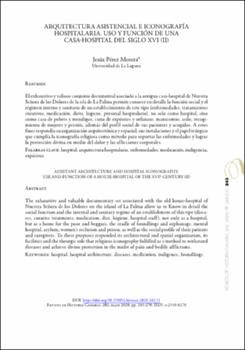Arquitectura asistencial e iconografía hospitalaria. Uso y función de una casa-hospital del siglo XVI (II)
Autor
Pérez Morera, Jesús
Fecha
2020Resumen
El exhaustivo y valioso conjunto documental asociado a la antigua casa-hospital de Nuestra
Señora de los Dolores de la isla de La Palma permite conocer en detalle la función social y el
régimen interno y sanitario de un establecimiento de este tipo (enfermedades, tratamientos
curativos, medicación, dieta, higiene, personal hospitalario), no solo como hospital, sino
como casa de pobres y mendigos, cuna de expósitos y orfanato, manicomio, asilo, recogimiento
de mujeres y prisión, además del perfil social de sus pacientes y acogidos. A estos
fines respondía su organización arquitectónica y espacial, sus instalaciones y el papel teúrgico
que cumplía la iconografía religiosa como método para soportar las enfermedades y lograr
la protección divina en medio del dolor y las aflicciones corporales. The exhaustive and valuable documentary set associated with the old house-hospital of
Nuestra Señora de los Dolores on the island of La Palma allow us to Know in detail the
social function and the internal and sanitary regime of an establishment of this tipe (diseases,
curative treatments, medication, diet, higiene, hospital staff), not only as a hospital,
but as a home for the poor and beggars, the cradle of foundlings and orphanage, mental
hospital, asylum, women’s seclusion and prison, as well as the social profile of their patients
and caregivers. To these purposes responded its architectural and spatial organization, its
facilities and the theurgic role that religious iconography fulfilled as a method to withstand
diseases and achieve divine protection in the midst of pain and bodily afflictions.





